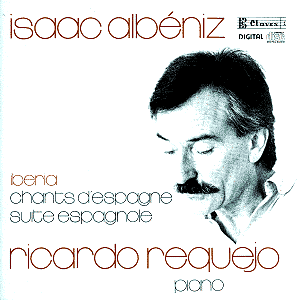Iberia
is in certain ways the pinnacle, not just of Spanish piano writing,
but of the whole, vast range of romantic literature for the instrument.
With their massive technical and interpretative demands, Albéniz’s
mainly Andalusian cahiers make up a scintillating collection
- too much so perhaps to be taken in one fell swoop. As Debussy wrote
on hearing Eritaña, last of the set: "Never has music
achieved such diversified, such colourful impressions: one’s eyes close,
as through dazzled from beholding too many pictures".
How
did Basque pianist Requejo meet the challenge in his 1980 Claves recording
(2CD boxed set)? Listening to his effortful Málaga, you'd
be forgiven for thinking that Albéniz had in mind not so much
the Costa del Sol as the Costa Gereatrica. Requejo’s playing is untouched
by that virtuosic flamboyance necessary to bring these sketches to life.
All the notes are there, but the playing ranges from pedestrian (Almería)
to incoherent (El polo) and beyond (a painfully halting Lavapiés).
Choppy rubato precludes much sense of singing line, or rhythmic life;
and though occasionally – notably at the start of Jeréz
- Requejo does succeed in conjuring some of Albéniz’s quieter
poetic moods, this is lumpen stuff at best.
The
two shorter but no less substantial suites make more musical sense,
especially given Requejo’s sensible removal of Asturia and Castilla
from Op.47 to their final place as Prelude and Seguidillas
in Op.232. Ultimately these too however are flat, overly cautious explorations.
Best turn to other hands - Alicia de Larrocha in Iberia and Op.47,
Orozco in the more elusive Op. 232 set - to evoke the blinding musical
and pianistic qualities Debussy recognised. Two stars awarded on account
of Claves’ clear, meaty and satisfying late analogue recording; but
pace Debussy, for this Iberia you’d be advised to close
not only your eyes, but also your ears.
Christopher Webber
